Imagine stepping out onto your screened porch, where fresh greens flourish, and the air is filled with inviting aromas. Not only can this space serve as your personal oasis,but it can also be a thriving hub for culinary inspiration. In this listicle,we present 27 carefully curated plants that not only beautify your porch but also serve a dual purpose as vibrant cooking herbs. Whether you’re a seasoned chef or simply enjoy adding fresh flavors to your everyday meals, you’ll discover a diverse array of plants that are easy to grow and even easier to incorporate into your culinary repertoire. From fragrant basil to zesty cilantro, this guide will equip you with all the necessary tools to transform your screened porch into a lush, herb-laden haven. Get ready to explore how these green wonders can elevate your cooking experience, enhance your dishes, and bring a touch of nature into your kitchen!
Basil: A classic culinary herb with a sweet, peppery flavor, perfect for Italian dishes and fresh pesto
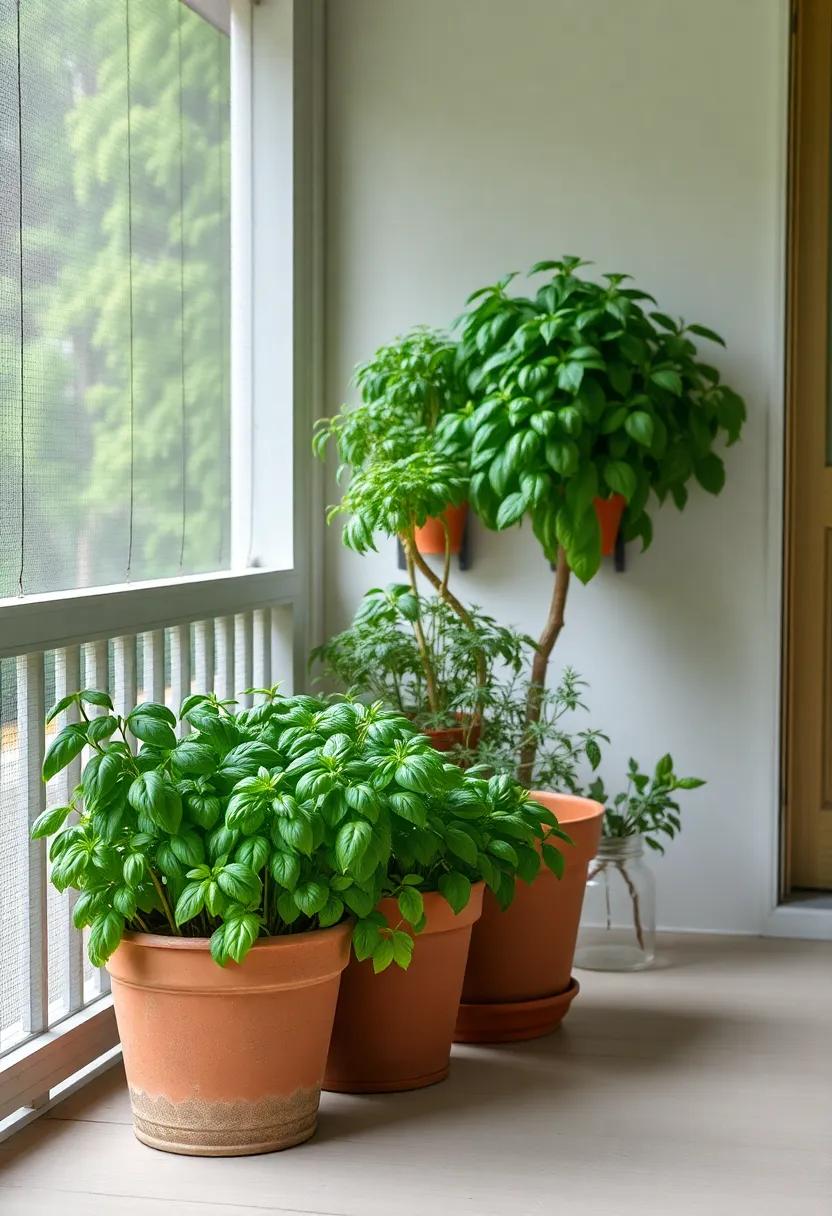
Basil is the quintessential herb that brings a touch of Mediterranean magic to your culinary creations. Its vibrant green leaves exude a sweet and peppery aroma that can transform even the simplest of dishes into gourmet delights. This herb thrives in the warm,sunny conditions of a screened porch,making it an ideal candidate for home herb gardening. Its versatility shines through in various Italian dishes, including classic marinara sauces, Caprese salads, and, of course, as the star ingredient in fresh pesto.
To cultivate basil effectively, consider the following tips:
- Sunlight: Ensure your basil receives at least 6-8 hours of direct sunlight each day.
- Watering: Water the plants regularly, allowing the soil to dry slightly between waterings to prevent root rot.
- Pruning: Regularly pinch back the leaves to encourage bushier growth and prevent flowering.
| Health Benefits | Culinary Uses |
|---|---|
| Rich in Antioxidants | Pesto, soups, salads |
| Supports Digestion | Pizza toppings, pasta dishes |
| Anti-inflammatory Properties | Herbal teas, infused oils |
Cilantro: Bright and zesty, cilantro adds a fresh pop to salsas, salads, and Asian cuisines

Cilantro is a vibrant herb that brings a burst of flavor to countless dishes. Its bright, zesty notes can elevate salsas with a refreshing kick, making your favorite dip even more tantalizing. Whether you’re crafting a classic pico de gallo or a unique mango salsa, a sprinkle of this herb can transform the taste experience. In salads, cilantro adds a lively contrast, beautifully complementing leafy greens and pairings like avocado or citrus for a satisfying crunch and a refreshing twist. This herb isn’t just limited to Mexican cuisine; it is indeed also a staple in various Asian cooking styles.
Its versatility shines through in dishes such as Thai curries, Vietnamese pho, and Indian chutneys, each showcasing cilantro’s ability to balance rich flavors with its fresh brightness. Consider pairing this herb with ingredients like lime, garlic, or ginger for an enhanced flavor profile. To grow cilantro on your screened porch, itS essential to provide well-draining soil and ample sunlight, as this plant thrives in warm conditions. With just a little care, you’ll have a continuous supply of this aromatic herb for all your culinary adventures.
Mint: Refreshing and aromatic, mint not only enhances drinks and desserts but also pairs well with savory dishes like lamb
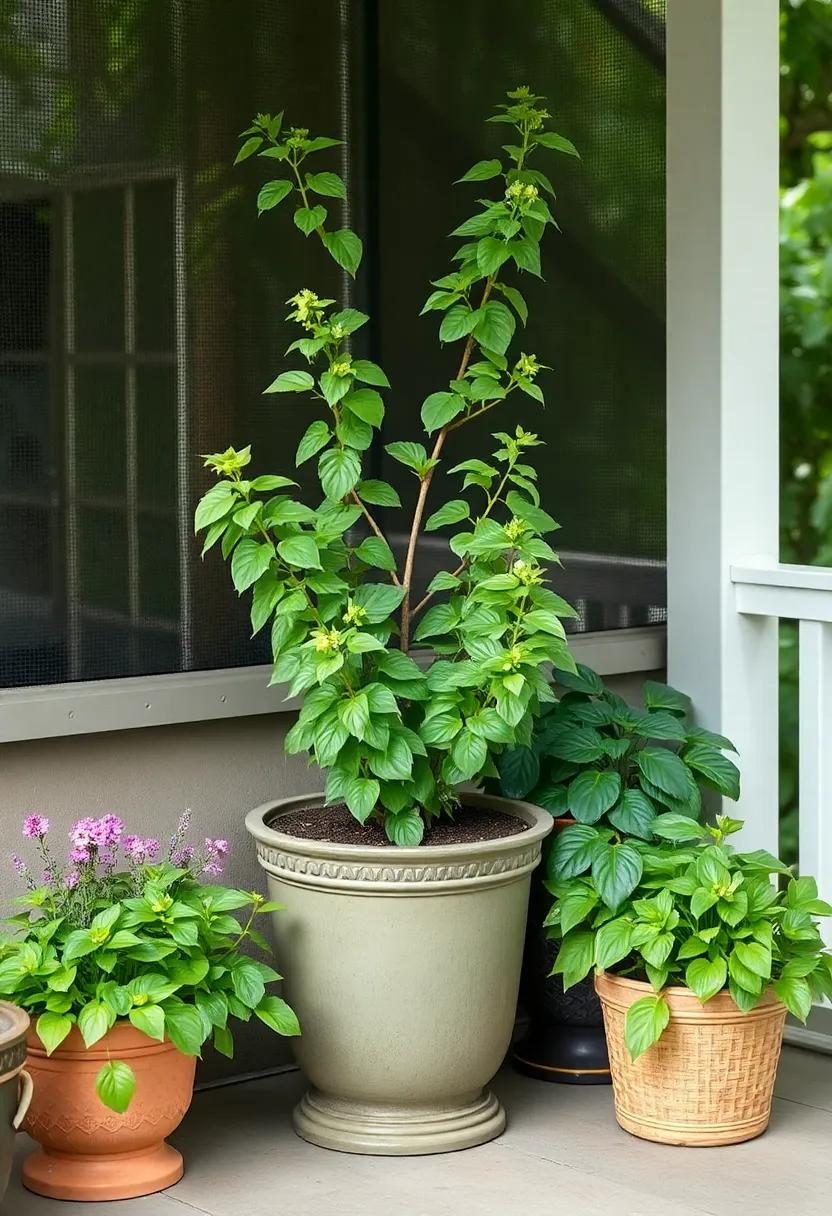
When you think of the vibrant green leaves of mint,you might instantly envision refreshing mojitos or elegant panna cotta garnishes. However, this versatile herb goes beyond the realm of beverages and desserts. Mint brings a delightful twist to savory dishes, especially when paired with succulent meats like lamb.The herb’s natural cooling properties complement the rich, robust flavors of lamb, creating a culinary harmony that will tantalize your taste buds. Consider adding freshly chopped mint to your marinades or as a garnish for roasted lamb chops to elevate your meal.
Incorporating mint into your cooking routine opens up a world of flavor possibilities. Use it to brighten up salads, infuse oils, or even create unique sauces that can enhance the profile of various dishes. Here are some creative ways to use mint:
- Mint Chimichurri: A lively sauce that pairs beautifully with grilled meats.
- Mint and Pea Risotto: Add a burst of flavor to your creamy risotto.
- Mint Yogurt Sauce: Serve this refreshing dip alongside spicy dishes.
- Mint-Infused Couscous: Elevate bland grains into a flavorful side.
| Mint Pairing Ideas | Flavor profile |
|---|---|
| Lamb | Rich & Savory |
| Peas | Sweet & Earthy |
| Yogurt | Creamy & Cool |
| Couscous | light & Fluffy |
Thyme: With its earthy aroma, thyme is versatile for seasoning meats, vegetables, and even soups and stews

One of the most beloved herbs in kitchens around the world,thyme offers an earthy aroma that enhances the flavor profile of a myriad of dishes.Its subtle yet distinctive taste makes it an amazing partner for seasoning meats, adding depth to roasted chicken or grilled steak. Simply sprinkle some fresh or dried thyme leaves over your favorite cuts before cooking, or toss it in with other herbs to create a robust marinade. With its adaptability, thyme also shines in vegetable dishes; consider infusing olive oil with thyme for drizzling over roasted root vegetables or adding it to a medley of sautéed greens for an aromatic twist.
Thyme is not limited to savory dishes—it can be a delightful addition to soups and stews as well. When simmered, its flavor becomes more pronounced, offering a comforting element to hearty recipes.Use sprigs of fresh thyme in your next batch of chicken soup or beef stew, allowing them to infuse their essence into the broth.Additionally, thyme pairs beautifully with other ingredients like garlic, lemon, and tomatoes, making it an all-rounder herb that deserves a spot in your screened porch garden.
Rosemary: This fragrant herb adds a robust flavor to roasted dishes, particularly potatoes and meats, while thriving in warm, sunny spots

Known for its distinctive scent and culinary versatility, this herb is a must-have for any cooking enthusiast looking to elevate their dishes. Its robust flavor pairs beautifully with a variety of ingredients, making it a perfect companion for roasted vegetables, especially potatoes, where it enhances the natural earthiness. A sprig or two can also bring a delightful depth to roasted meats, including chicken and lamb. When planning your garden for the screened porch, consider choosing varieties that can thrive in your habitat, particularly those that bask in the sun. Fresh rosemary sprigs not only enhance your meals but also provide a fragrant aroma to your space.
To ensure you cultivate a thriving rosemary plant,keep in mind a few essential care tips:
- Sunlight: Rosemary loves bright,direct sunlight; place it in a south-facing location for optimal growth.
- Soil: Use well-draining potting mix, as rosemary is susceptible to root rot in overly moist conditions.
- Watering: Be cautious not to overwater; let the top inch of the soil dry out before watering again.
This herb is not only a culinary delight but also a visually appealing addition to your screened porch with its slender green leaves and delicate purple flowers that bloom in the right conditions.
Oregano: Essential in Mediterranean cooking, oregano is a flavorful addition to sauces, marinades, and pizza

Oregano is a staple in many Mediterranean dishes,renowned for its aromatic and slightly peppery flavor that can elevate a variety of culinary creations.This versatile herb thrives in a sunny, screened porch garden and can be snipped at a moment’s notice to enhance your cooking. It effectively works beautifully in tomato-based sauces, lending depth and richness, while also playing a key role in marinades for meats and vegetables.When it comes to pizza, no slice is complete without a sprinkle of oregano, which marries perfectly with cheese and other toppings to create an unforgettable experience.
In addition to its delightful flavor, oregano is packed with antioxidants and has been linked to various health benefits, making it a wholesome addition to your culinary repertoire. To make the most of this aromatic herb, consider using it in various forms, such as fresh leaves, dried flakes, or infused oils. Here’s a fast look at some popular uses:
| Use | Description |
|---|---|
| Pasta Dishes | A sprinkle of oregano complements tomato sauces and rustic pasta meals. |
| Grilled Meats | Add to marinades for a zesty kick that enhances the flavor of chicken, lamb, or pork. |
| Salads | Blend fresh oregano into dressings or toss into salads for an aromatic touch. |
| Vegetable Roasts | Combine with olive oil and roasted veggies for a savory finish. |
Chives: Mildly onion-flavored, chives are perfect for garnishing dishes, adding a subtle kick to soups, salads, and butter
Chives are a delightful choice for any screen porch herb garden, bringing a subtle onion flavor that can elevate even the simplest of dishes. With their slender green stems and vibrant hue, they not only enhance the aesthetic but also add a fresh twist to your cooking. Use them to garnish soups, where their delicate flavor pairs beautifully with broths, or sprinkle them over salads to introduce a light crunch and visual appeal. Chives can also make for a flavorful addition to butter, creating a compound butter that’s perfect for spreading on warm bread or melting over grilled vegetables.
the versatility of chives in the kitchen is truly remarkable. Here are a few inventive ideas to incorporate these herbs into your cooking:
- chive-infused Oil: Blend fresh chives with your favorite oil for a flavorful finishing touch on dishes.
- Omelettes: Add chopped chives into your egg mixture for a burst of flavor and color.
- Potatoes: Mashing them together with chives creates a creamy, savory side that complements any main dish.
When growing chives, they thrive in sunny spots with well-drained soil, making them ideal for your screened-in space. Here’s a quick overview:
| Growing Tips | watering | Sunlight |
|---|---|---|
| Well-drained soil required | Moderate, allow soil to dry slightly | Full sun to partial shade |
Parsley: A staple in many recipes, parsley brightens dishes and serves as a vibrant garnish for plates of all kinds
Parsley is frequently enough revered as the unsung hero of the herb world, effortlessly elevating a multitude of dishes. Its fresh, slightly peppery flavor profile makes it a versatile choice for culinary applications, ranging from Mediterranean to American cuisines. The vibrant green leaves can be chopped and added to salads,soups,sauces,and marinades,lending a burst of freshness that brightens even the simplest of recipes. Beyond its flavor, parsley is a nutritional powerhouse, packed with vitamins A, C, and K, making it an excellent addition to your meals for both taste and health benefits.
Not only does parsley enhance the flavor of your dishes, but it also serves as a stunning visual garnish that can turn an ordinary plate into a gourmet presentation.You can use it to top off a creamy risotto, sprinkle over grilled vegetables, or add a finishing touch to a savory pie. Its rich green hue complements a variety of colors in dishes,creating a feast for the eyes and also the palate. Here are some popular ways to incorporate parsley into your cooking:
- Chimichurri Sauce: A herby sauce ideal for drizzling over grilled meats.
- Tabbouleh Salad: A refreshing salad packed with bulgur, tomatoes, and parsley.
- Pesto Verde: A vibrant green sauce to liven up pasta or sandwiches.
- Garlic Butter: mix with parsley to slather on fresh bread or seafood.
- Herb-Infused Oils: Make your own infused oil with parsley for drizzling and dipping.
Dill: This herb’s unique flavor is great for pickles, salads, and seafood dishes, bringing a hint of freshness to every bite
Dill serves as a vibrant addition to your culinary repertoire, infusing dishes with a distinctive flavor that’s both refreshing and aromatic. This herb’s delicate feathery fronds are not only a feast for the eyes but also a versatile ingredient that enhances a variety of meals. Use dill to elevate your pickles by incorporating it into the brining process, allowing the herb’s flavor to seep into crunchy cucumbers for an unforgettable tang. Beyond pickling, add fresh dill to salads, where its zesty notes can complement ingredients like cucumber and tomato, resulting in a bright, flavorful medley that perfectly captures the essence of summer.
When it comes to seafood, dill shines as a classic pairing with fish dishes, providing a fresh contrast to rich flavors. Whether it’s sprinkled atop baked salmon or mixed into a creamy sauce for shrimp, dill enhances the natural taste of the ocean. With its aromatic profile, dill not only enriches the palate but also offers health benefits, including antioxidant properties and digestive support. Try incorporating it into creamy dressings or serving dishes like potato salad and tzatziki for an extra burst of flavor that will keep your taste buds dancing.
Sage: with its strong, earthy flavor, sage complements rich dishes and roasted meats wonderfully, flourishing in the sunlight

Sage, with its robust and earthy taste, brings an aromatic magic to a variety of culinary creations. This herb is particularly remarkable when paired with rich dishes, helping to elevate flavors in everything from hearty sauces to sumptuous roasts. The bright, slightly peppery notes of sage contrast beautifully with fatty meats, making it a favorite in classic recipes such as sage and brown butter sauce for pasta, or as a seasoning for roasted poultry and pork. Its strong presence can help to cut through the richness, adding depth and balance to your meals.
This culinary gem thrives in a sunny spot,making it an ideal candidate for your screened porch garden. As a perennial herb, sage not only brings exceptional flavor but also an appealing green texture to your space. Regular trimming encourages bushy growth, allowing you to harvest fresh leaves throughout the cooking season.Whether you’re making a cozy autumn soup or preparing a festive holiday feast, having sage on hand is truly a culinary delight. Here’s a quick reference table of mouthwatering dishes that transcends the ordinary with sage:
| Dishes with sage | Complementary Ingredients |
|---|---|
| Sage Butter Sauce | Pasta, Nuts |
| Stuffed Turkey | Stuffing, Cranberries |
| Roasted Root Vegetables | Olive Oil, Garlic |
| Pork Chops with Sage | Apples, Onions |
Tarragon: Known for its slightly anise flavor, tarragon is brilliant in dressings, sauces, and French cuisine

Tarragon, with its distinctive slightly anise flavor, brings a unique and aromatic touch to various dishes.When it comes to dressings,a sprinkle of fresh tarragon can elevate simple vinaigrettes into something unusual,balancing acidity with its herbaceous notes. In sauces, particularly classic French sauces like béarnaise, tarragon plays a leading role, enhancing the complexity and depth of flavors. Its versatility is seen in a myriad of dishes, where it harmonizes beautifully with chicken, fish, and vegetables, making it a staple for any aspiring chef.
Growing tarragon in your screened porch not only allows for easy access to this vibrant herb but also ensures you have it fresh at your fingertips. Here are a few creative ways to incorporate it into your cooking:
- Herb-Infused Oils: Blend tarragon with olive oil for a fragrant drizzle over grilled vegetables.
- Marinades: Use tarragon in marinades to impart a unique flavor profile to your meats.
- Salad Enhancer: Add freshly chopped tarragon to salads for a refreshing twist.
| Dish | Flavor profile |
|---|---|
| Vinaigrettes | Refreshing and tangy |
| Béarnaise Sauce | Rich and creamy |
| Roasted Chicken | Savory and aromatic |
Lemongrass: An aromatic herb that adds a citrusy brightness to soups and Asian dishes, making it a must-have for a fresh flavor

Lemongrass is a versatile herb that can infuse a variety of dishes with its vibrant citrus notes. Known for its tall, slender stalks and pleasant aroma, it’s particularly popular in thai, Vietnamese, and other Southeast Asian cuisines. When used fresh or dried, lemongrass brings a unique brightness to soups, curries, and marinades, enhancing the overall flavor profile. To incorporate it into your cooking, simply chop the tender parts of the stalk finely or use a bruising method to release its essential oils, allowing the herb to blend harmoniously with other ingredients.
This aromatic herb doesn’t just elevate the taste of your meals; it also contributes to a delightful sensory experience. Imagine a steaming bowl of tom Yum soup peppered with lemongrass, or a refreshing Lemongrass-infused stir fry bursting with vegetables and proteins. For culinary enthusiasts looking to grow their own supply of this herb, lemongrass thrives beautifully on screened porches, where it can bask in the sunlight while being sheltered from pests. Embrace its culinary potential,and let the zest of lemongrass invigorate your cooking adventures!
Bay Leaves: Often used in stews and soups,bay leaves contribute a deep flavor during cooking and can be harvested fresh year-round
When it comes to adding a complex depth of flavor to your culinary creations,few herbs can compete with the humble bay leaf. Renowned for its ability to subtly enhance the taste of stews, soups, and sauces, fresh bay leaves are a delightful herb that can elevate your home cooking. Available year-round, they bring a rich aroma reminiscent of the Mediterranean, making them an essential ingredient in countless recipes. Whether slow-cooked in a hearty soup or simmered in a robust stew, these leaves impart a distinctive flavor that develops beautifully over time.
Growing bay leaves in your screened porch not only allows you to enjoy their flavor fresh from your garden but also gives your cooking an aromatic lift. You can easily incorporate fresh leaves into your meals; just remember to remove them before serving, as they can be tough and fibrous. to help you get started with growing and utilizing bay leaves effectively, here’s a handy table summarizing key uses and guidelines:
| Use | Cooking Tips |
|---|---|
| Stews | Add 1-2 leaves during cooking; remove before serving. |
| Soups | Simmer with other ingredients for added depth. |
| Marinades | Incorporate crushed leaves for flavor infusion. |
| Herbal Teas | Steep in hot water for a soothing drink. |
Chervil: An often-overlooked gem,chervil’s delicate taste is perfect for finishing dishes and enhances flavors beautifully
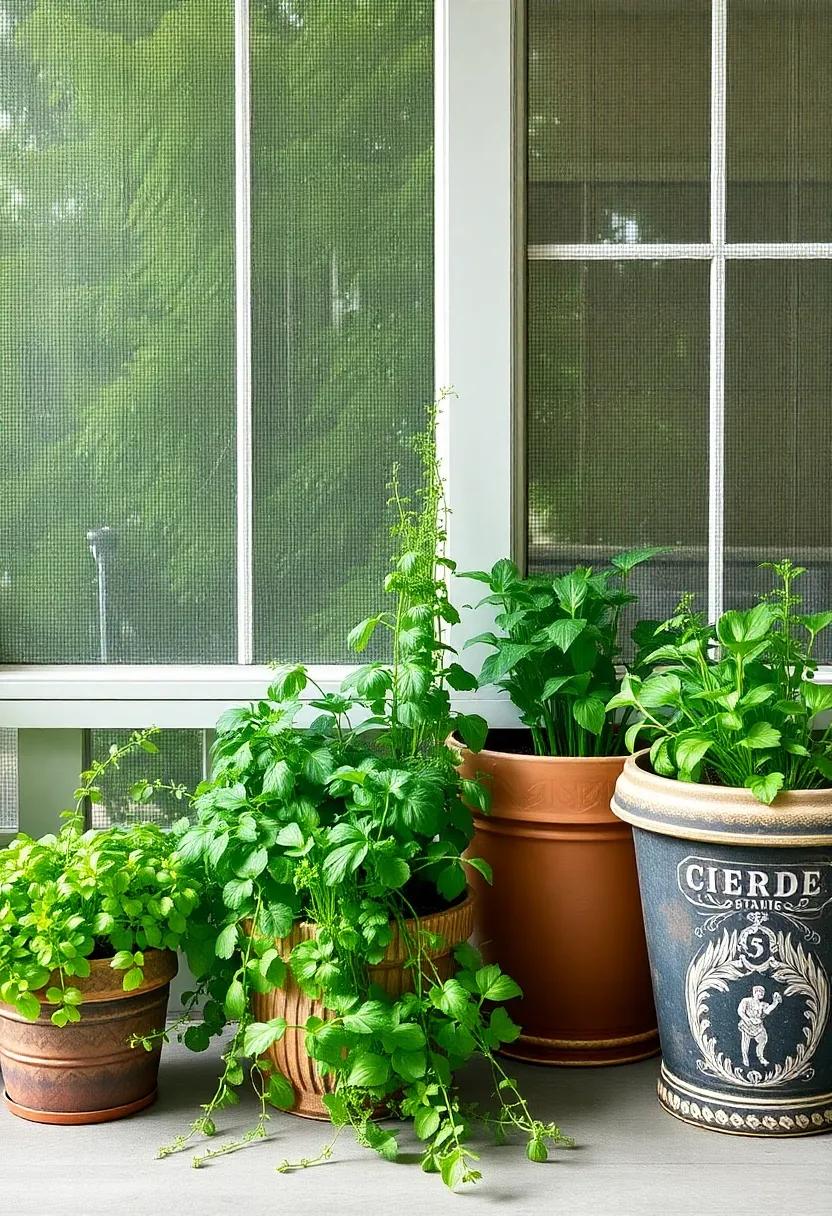
With its feathery leaves and subtle anise-like flavor, chervil is one of those culinary herbs that often flies under the radar. This versatile herb thrives in cooler conditions,making it a perfect candidate for a screened porch environment where it can bask in filtered sunlight. Its delicate taste enhances dishes without overpowering them, making it ideal for finishing dishes such as soups, salads, and sauces. When used as a garnish, chervil adds not only a pop of green but also an exquisite layer of flavor that brightens up any meal.
Chervil pairs wonderfully with a variety of ingredients, including:
- Vegetables: Excellent with peas, carrots, and asparagus.
- Fish: Complements the richness of salmon and white fish beautifully.
- Dairy: Works well when mixed into cream sauces or sprinkled on cheese platters.
- Eggs: A delightful addition to omelets and quiches, enhancing their flavor.
Incorporating chervil into your culinary repertoire can elevate your dishes and introduce a new dimension of taste that you didn’t know was missing. Whether used fresh or as part of a herb blend, this often-overlooked gem deserves a rightful place in your garden or kitchen.
Fennel: Known for its distinct sweet flavor, fennel fronds elevate salads and roasted vegetables with a hint of anise
Fennel brings a unique twist to your culinary creations with its remarkable sweet flavor and refreshing aroma. The feathery green fronds, which resemble delicate fern leaves, can be added to a variety of dishes, from vibrant salads to warm roasted vegetables. When incorporating fennel fronds into your recipes, consider using them to garnish mediterranean-style salads or finish off roasted root vegetables for a vibrant pop of color and flavor. The subtle anise-like taste of fennel complements other ingredients beautifully, making it a perfect candidate for enhancing healthy meals.
Beyond its culinary uses, fennel is also a visually appealing addition to your screened porch garden. Its tall, feathery stalks create an attractive focal point amidst other herbs. When growing fennel, ensure it receives ample sunlight and well-drained soil for optimal growth. To help you get started, here’s a quick-reference table summarizing essential fennel growing tips:
| Aspect | Details |
|---|---|
| Sunlight | Full Sun (6-8 hours) |
| Soil Type | Well-drained, fertile soil |
| Watering | Moderate, avoid overwatering |
| Harvesting | Cut fronds as needed |
Nasturtium: Both the leaves and flowers are edible, bringing a peppery flavor that brightens salads and garnishes delightfully
Nasturtium is not just a feast for the eyes with its vibrant hues of orange and yellow; it also brings a unique peppery flavor to your culinary creations. Both the leaves and flowers of this delightful plant are edible,making them perfect additions to salads or garnish for a wide variety of dishes. The leaves can be used as a peppery green in mixed salads or as a fresh element in sandwiches, while the flowers add a splash of color and flavor that elevates any meal. Imagine tossing some of these blossoms into your summer salad—it’s like nature’s confetti!
As a member of the cruciferous family,nasturtium is known not only for its flavor but also for its health benefits. The plant is rich in vitamins and minerals,including vitamin C,and is known to contain antimicrobial properties.Dedicated home cooks appreciate nasturtium for its versatility in the kitchen. Here’s a quick summary of its culinary uses:
| Part of Plant | Usage |
|---|---|
| Leaves | Use as a peppery salad green or blended into pesto. |
| Flowers | Add to salads for color or use as a garnish on appetizers. |
| Seeds | Pickle them for a spicy condiment. |
Celery Leaf: Often discarded, celery leaves are a flavorful addition to stocks, salads, or as a garnish that packs a punch
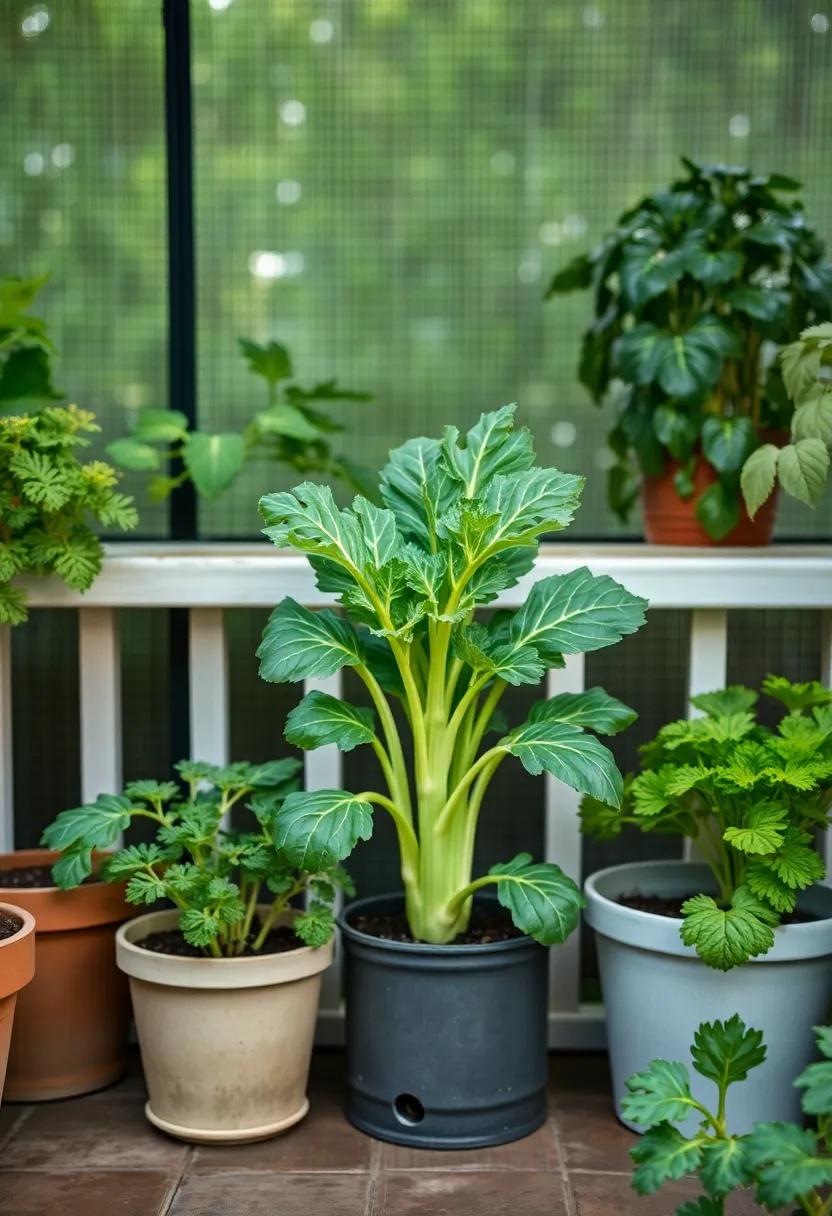
Often overlooked,the leaves of celery are a hidden treasure in your kitchen that can elevate your culinary creations. With a vibrant green hue and a flavor profile that combines a mild earthiness with a hint of pepper, they serve as a delightful addition to a variety of dishes. You can finely chop celery leaves and incorporate them into salads for added texture and freshness, or use them as a vibrant garnish for soups and stews. Their robust flavor also makes them an excellent choice for enhancing homemade stocks, bringing depth and a lively herbal note that can transform your broth into something extraordinary.
Integrating celery leaves into your cooking not only boosts flavor but also reduces food waste, as they are often discarded without a second thought. Consider these creative uses for celery leaves:
- Pesto Substitute: Blend celery leaves with nuts, cheese, and oil for a unique twist on traditional pesto.
- Herb Mixes: Combine with parsley and cilantro to create a zesty herb blend for seasoning meats or vegetables.
- Flavor Infusion: Add whole leaves to marinades or dressings for an herbal infusion that packs a punch.
Incorporate these flavorful leaves not only for their taste but also for their nutritional benefits, as they are rich in vitamins A, C, and K. With its versatility and distinct flavor, celery leaves are sure to become a staple in your screened porch herb garden.
Italian Flat leaf parsley: The flat-leaf variety of parsley is preferred for cooking, adding more flavor than its curly cousin

Flat-leaf parsley, with its broad, flat leaves and robust flavor, is a chef’s best friend. Its earthy and slightly peppery taste makes it a versatile ingredient in various cuisines, particularly italian dishes. unlike its curly-leaf counterpart,which is mainly used as a garnish,this variety truly shines when incorporated into meals. You can toss it into pastas, sprinkle it over grilled meats, or muddle it into fresh salads for added freshness. The vibrant green color of flat-leaf parsley also brings a visual appeal, making any dish not only taste better but also look extraordinary.
Growing this herb on your screened porch provides easy access to a fresh supply right at your fingertips. It’s surprisingly simple to cultivate—requiring well-drained soil and a good amount of sunlight. Here are some helpful tips for maintaining your flat-leaf parsley:
- Watering: Keep the soil consistently moist but not soggy.
- Harvesting: Regularly trim leaves to stimulate growth and ensure a continuous supply.
- Companion Planting: It thrives alongside vegetables such as tomatoes and carrots, enhancing their growth.
| Benefits | Usage |
|---|---|
| Enhanced Flavor | Use in sauces, stews, or as a seasoning. |
| Nutritional Value | Rich in vitamins A, C, and K. |
| Aesthetic Appeal | Great for garnishing and enhancing dish presentation. |
Catnip: While known for its effects on felines, this herb is also edible and lends a mild minty flavor to teas and desserts
While many associate catnip primarily with joyous feline frolics, this delightful herb also brings its unique charm to the culinary world. Thanks to its mild minty flavor, catnip serves as an intriguing addition to various dishes and beverages. Whether brewed as a tea or sprinkled into desserts, it offers a refreshing twist that is both soothing and aromatic. Combine it with honey for a relaxing evening drink after a busy day, or experiment by infusing it into cream for an herbaceous twist on classic custards.
This versatile herb boasts an impressive nutritional profile, packed with beneficial properties. Here’s a snapshot of why you might consider adding it to your cooking repertoire:
| Nutritional Benefits | Flavor Profile |
|---|---|
| Rich in antioxidants | Refreshing and slightly sweet |
| Source of vitamins C and A | Herbaceous with a hint of mint |
| Supports digestive health | Earthy undertone complements sweets |
Just like other culinary herbs, catnip can be creatively integrated into various recipes.Think catnip-infused lemonade or a unique catnip garnish for fruity desserts. With its intriguing flavor profile and promise of wellness, it’s clear this herb deserves a celebrated spot on your culinary shelf. So why not let your taste buds explore the enchanting world of catnip beyond its feline-friendly reputation?
Marjoram: Similar to oregano but sweeter, marjoram is perfect for integrating into meat dishes and sauces for an extra depth of flavor

With its delicate flavor profile, this herb brings a subtle sweetness that can elevate your culinary creations. Especially in meat dishes,marjoram pairs beautifully with rich proteins like beef,lamb,and chicken,enhancing their natural flavors without overwhelming them. Its fragrant aroma adds a layer of complexity to hearty sauces, delivering an exquisite taste that guests will rave about. Incorporate marjoram into a marinade for grilled meats or sprinkle it atop roasted vegetables for a touch of garden elegance.
Besides adding a sweet, yet slightly peppery taste, this herb is incredibly versatile in the kitchen. Consider blending marjoram into creamy dressings or incorporating it into your favorite pasta dishes for a fragrant touch. You can even use it to season homemade bread or muffins, infusing them with a delightful twist. As an added bonus, fresh marjoram is simple to grow in pots on your screened porch, making it a convenient choice for both cooking and aesthetics.
Lemon Balm: With a refreshing lemon scent, lemon balm is perfect for teas, desserts, and flavoring fish dishes
Lemon balm is a versatile herb that brings a delightful citrus note to your culinary creations. With its vibrant, fresh aroma, this herb can transform your dishes and beverages into something truly special. Use it to brew a soothing tea by steeping fresh lemon balm leaves in hot water, adding a touch of honey for sweetness. Alternatively, sprinkle some finely chopped leaves into your desserts to introduce a zesty twist to cakes, cookies, and sorbets. Its refreshing taste pairs wonderfully with fruits, making it a perfect addition to fruit salads or smoothies.
Moreover, lemon balm is an unexpected yet brilliant choice for seasoning fish dishes. Its lightness complements the delicate flavors of seafood beautifully.Simply incorporate lemon balm into marinades or sprinkle it over grilled or baked fish to elevate the dish. The herb also works splendidly with vegetables and grains, adding a bright finish to stir-fries and salads. With such versatility,lemon balm truly shines as a culinary herb that not only tantalizes the palate but also enhances the presentation of your screened porch garden.
Garlic Chives: These chives carry a mild garlic flavor,making them a flavorful addition to stir-fries,salads,and dips
Garlic chives are a delightful herb that enhances your culinary creations with their mild garlic flavor,offering a subtle punch without overpowering your dish. Perfect for brightening up a variety of recipes, these herbs can elevate the flavors of your favorite stir-fries, adding a fresh, aromatic lilt that complements meats, seafood, and tofu alike.Just chop them finely before tossing them into the pan during the last few minutes of cooking to preserve their vibrant taste and color.
In addition to stir-fries, garlic chives shine in salads, where their delicate yet flavorful notes can transform a basic mix of greens into something extraordinary. combine them with tomatoes, cucumbers, and a light vinaigrette for a refreshing side dish. Moreover, they make a fantastic base for dips, giving a hint of garlic flavor that pairs beautifully with creamy ingredients like sour cream or yogurt. Experiment by incorporating minced garlic chives into your guacamole or a classic herb dip to surprise and delight your guests!
Fish Mint: A unique addition for fish lovers, fish mint adds a distinct flavor to seafood dishes and pairs wonderfully with rice
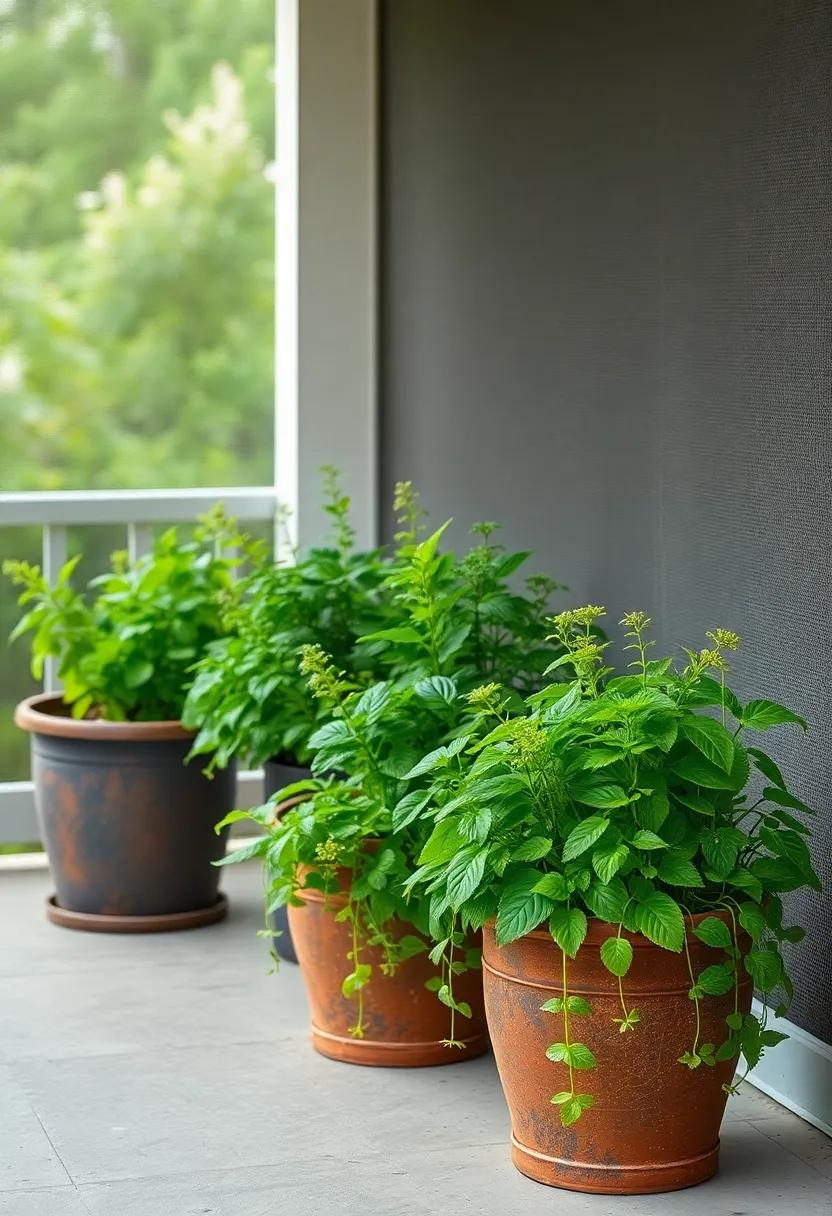
For seafood aficionados looking to elevate their culinary game, fish mint offers an exceptional twist that can transform ordinary dishes into extraordinary experiences. This unique herb, often found in Southeast Asian cuisine, boasts a vibrant flavor profile that harmonizes beautifully with fish, enhancing the natural taste of seafood without overpowering it. From grilled salmon to delicate shrimp stir-fries, incorporating fish mint can add a surprising freshness that brightens each bite and elevates the dining experience.
fish mint pairs seamlessly with rice, making it an ideal herb to cultivate on your screened porch.Imagine savoring a bowl of jasmine or basmati rice topped with steamed fish and a sprinkle of freshly chopped fish mint; the aroma and taste will undoubtedly linger in your memory. Consider these delightful combinations:
| Dish | Fish Mint Submission |
|---|---|
| grilled Mackerel | Garnish with chopped fish mint and a squeeze of lemon. |
| Coconut Curry Shrimp | Add whole leaves for a fragrant finish. |
| Spicy Rice Noodles | Fold in finely chopped fish mint before serving. |
| sushi rolls | Incorporate into the filling for an unexpected burst of flavor. |
Sorrel: With its tart, lemony flavor, sorrel is great in salads or sauces, offering a zesty kick to any meal
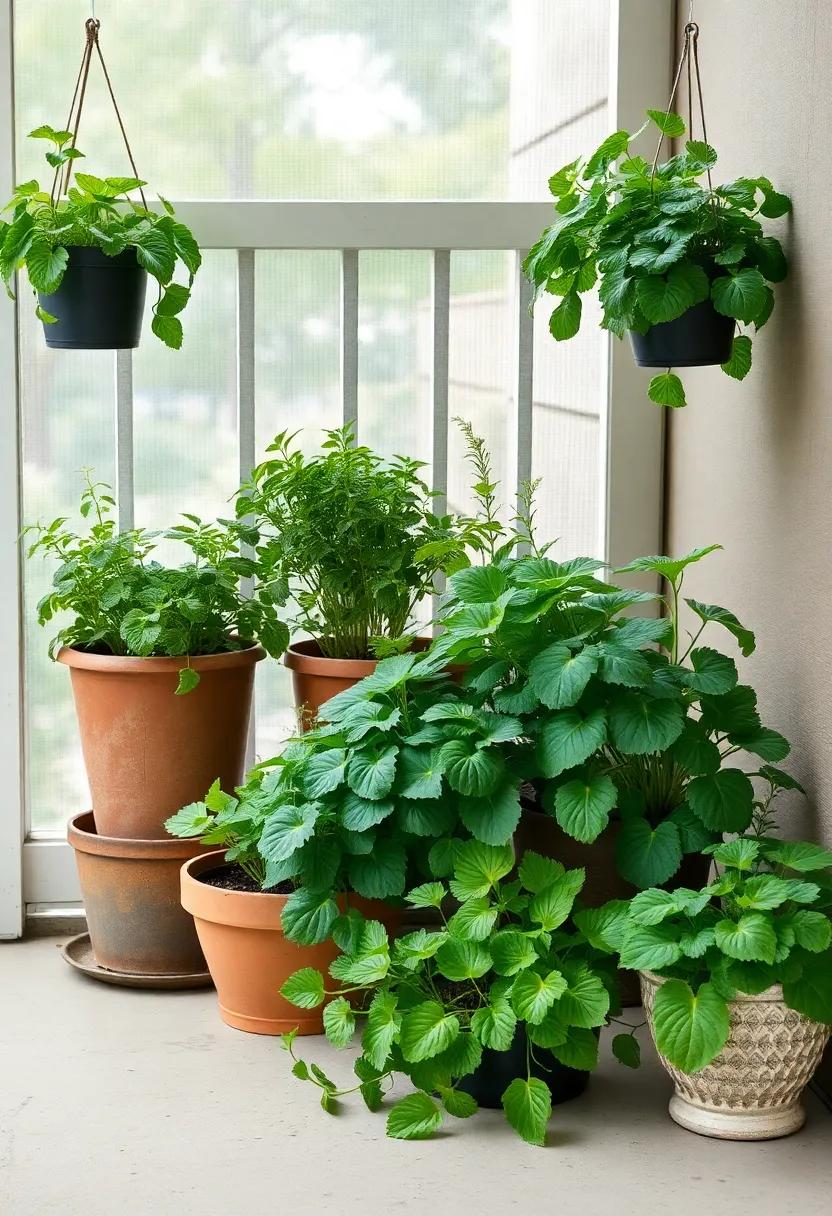
Sorrel is a delightful herb that packs a punch with its bold, tart, and refreshing lemony flavor. This perennial green is perfect for brightening up your culinary creations,whether you’re tossing it into a vibrant salad or incorporating it into a savory sauce. The bright greens can elevate the classic vinaigrette, making it a tangy dressing that complements a variety of vegetables and meats. For a simple yet elegant dish, try blending freshly chopped sorrel leaves with olive oil, garlic, and a touch of lemon juice to create a zesty sauce that can accompany grilled chicken or fish.
Moreover, sorrel’s unique flavor allows it to shine as a star ingredient in soups, where its acidity can balance the richness of creamy bases. A classic example is sorrel soup, where the greens are pureed into a smooth, refreshing dish that tantalizes the taste buds. Adding sorrel to cheese spreads not only deepens flavor but also adds a vibrant green hue. Let this herb inspire your creativity in the kitchen with its versatile uses that ensure every meal is a appetizing adventure.
Perilla: Often used in Asian cuisines,perilla leaves bring a unique flavor that’s both nutty and minty,perfect for wraps and garnishes
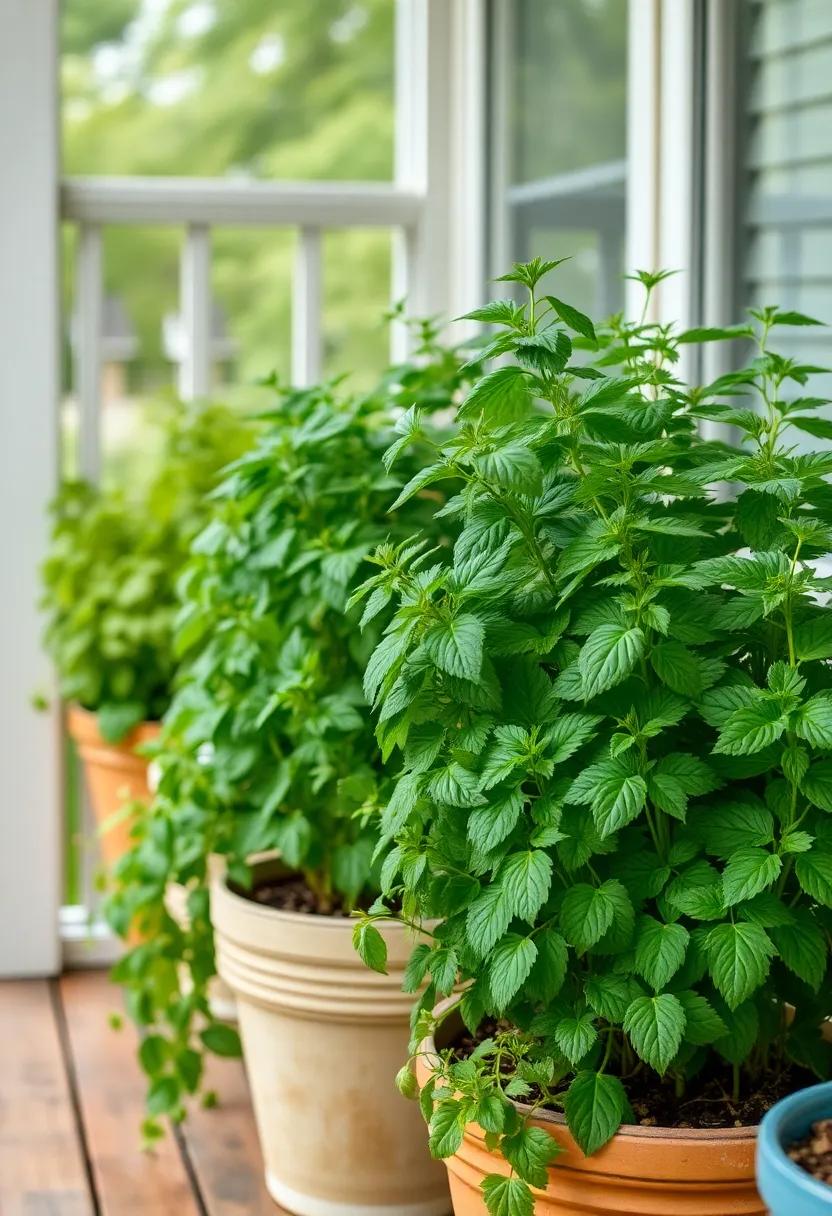
Perilla
Perilla,often referred to as Korean mint or shiso,is a vibrant herb that adds an explosion of flavor to various dishes. Its striking green or purple leaves are not just visually appealing but also introduce a delightful blend of nutty and minty notes that elevate the simplest of wraps. Whether you tuck it into your favorite summer rolls or use it as a garnish for grilled meats, perilla closes the gap between fresh herbs and vegetables, making your culinary creations truly exceptional.
This versatile herb is also a powerhouse in terms of health benefits, rich in antioxidants and known for its anti-inflammatory properties. Easily grown in pots on your screened porch, perilla leaves can be harvested year-round, providing you with a continuous supply of flavor. Here are some creative ways to incorporate perilla into your cooking:
- Wrap grilled meats or vegetables for a refreshing bite.
- Chop and mix into salads for added texture.
- Use in marinades for an unexpected twist.
- Add to rice dishes for an aromatic infusion.
stevia: This natural sweetener can be grown in your screened porch, perfect for adding sweetness to beverages and desserts without sugar
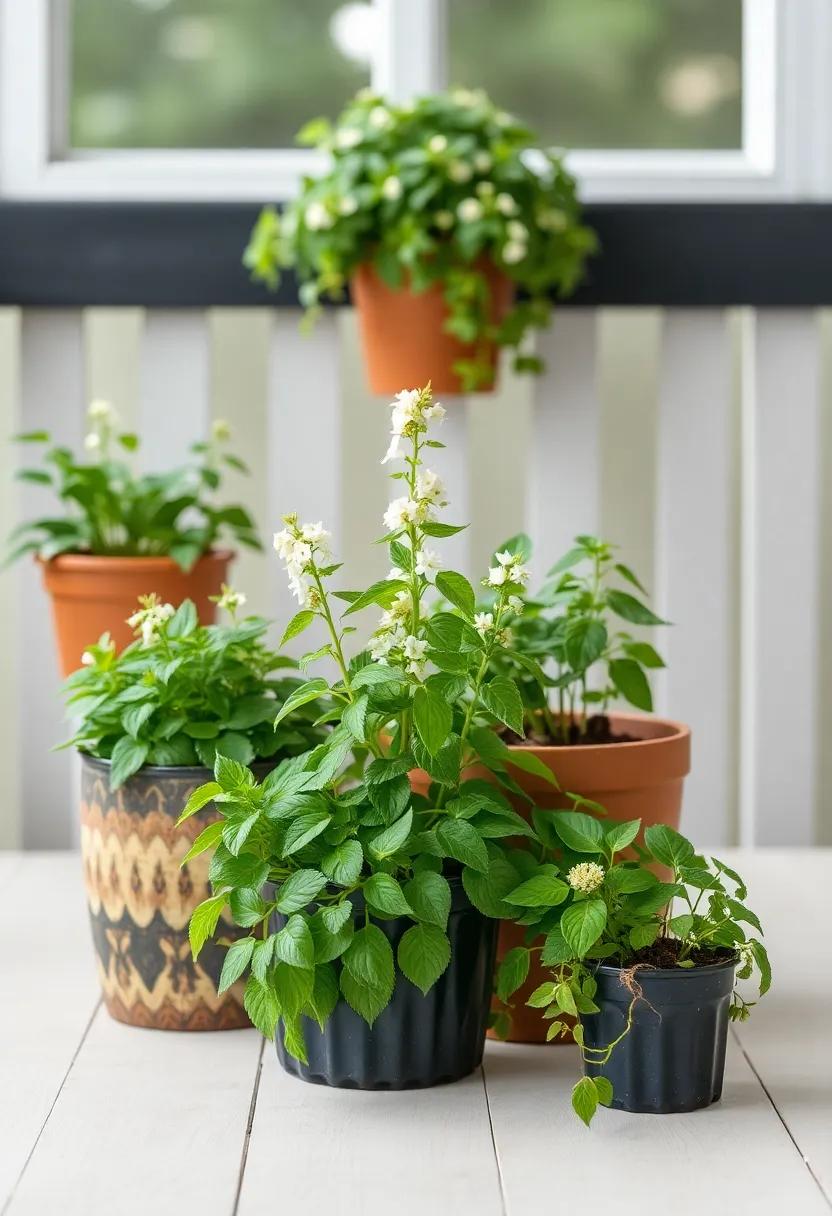
Imagine stepping onto your screened porch and being greeted by the vibrant green leaves of stevia, a delightful natural sweetener that can elevate your culinary creations. Not only does this plant thrive in the cozy confines of your porch, but it also offers a range of health benefits that make it an ideal choice to sugar. With its intense sweetness derived from the leaves, using stevia in your beverages and desserts can significantly reduce your sugar intake while still satisfying your sweet tooth. whether you’re brewing a cup of herbal tea or whipping up a batch of cookies, fresh stevia leaves can provide that perfect touch of sweetness.
Stevia plants require minimal care, making them perfect companions for novice gardeners and seasoned herb enthusiasts alike. To grow your own stevia, simply follow these tips:
- Light: place your stevia pot in a spot that receives at least 6 hours of sunlight daily.
- watering: Keep the soil consistently moist but not waterlogged to prevent root rot.
- Harvesting: When the leaves are at their peak sweetness, simply snip them off and either use them fresh or dry them for future use.
If you’re curious about incorporating stevia into your everyday life, here’s a quick reference table to inspire your next culinary adventure:
| Beverages | Desserts |
|---|---|
| Herbal teas | Brownies |
| Smoothies | Cakes |
| homemade lemonade | Pancakes |
| Sparkling water | icing for cakes |
Sweet Woodruff: With its sweet, hay-like scent, sweet woodruff is great for sweet dishes and beverages, bringing a unique flavor to your herb collection

Sweet woodruff is an enchanting herb that brings an aromatic charm to any space. With its distinct sweet, hay-like fragrance, it’s a delightful addition to both cooking and crafting beverages. Traditionally used in German May wine, its flavor profile perfectly complements fruity desserts and creamy confections. Imagine infusing your homemade ice cream or syrups with this herb,creating a refreshing twist that elevates your culinary creations. Sweet woodruff can also be brewed into teas or added to cocktails, introducing a whimsical essence that surprises the palate.
In addition to its culinary uses, sweet woodruff holds a unique place in herbal lore. Here are some interesting ways to include this herb in your seasonal dishes:
- Flavored syrups: Use sweet woodruff to create unique syrups for drizzling over pancakes or waffles.
- Herbal jellies: Incorporate the herb in jellies, pairing well with tart fruits like strawberries or rhubarb.
- salad accents: Toss fresh sweet woodruff leaves into fruit salads for an aromatic twist.
- Homemade liqueurs: Infuse spirits with sweet woodruff for a personal touch in your drinks.
For those looking to grow sweet woodruff,here is a simple table highlighting key requirements and tips:
| Growing Condition | Details |
|---|---|
| Sunlight | Partial to full shade |
| Soil Type | Moist,well-drained soil |
| Watering | Regular moisture,avoid drying out |
| Harvesting Time | Spring through early summer |
Final Thoughts
As we wrap up our exploration of “,” we hope you’ve found inspiration to enrich your cooking and enhance your outdoor sanctuary. These versatile plants not only bring life and vibrancy to your screened porch but also offer a bounty of flavors that can elevate your culinary creations.
Imagine taking a leisurely stroll through your porch garden, snipping fresh basil for a homemade pesto or gathering sprigs of rosemary to infuse a savory roast. Each plant is a new adventure waiting to inspire your next meal.
So, whether you’re a seasoned chef or a novice cook, consider transforming your screened porch into a haven of both beauty and flavor.With careful selection and nurturing, your plants will flourish—just like your cooking skills. Here’s to delightful meals, fresh aromas, and the joy of harnessing nature’s gifts right at your fingertips.happy gardening and cooking!
 decorifusta Garden and patio decoration inspiration
decorifusta Garden and patio decoration inspiration 






